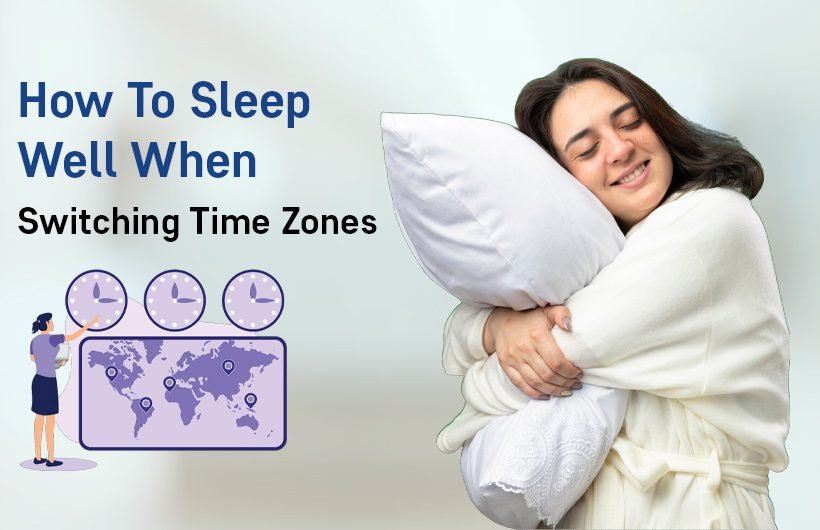Switching time zones can leave even the best sleepers struggling to get a good night’s sleep. Whether it’s for business travel, a vacation, or visiting family, traveling across time zones can disrupt your body’s natural rhythms.
People will take it much further because this disruption leads to common sleep issues like insomnia, fatigue, and lack of focus. Luckily for you, though, there are effective ways to adjust and get better sleep, no matter where you’re in the world.
This guide will cover real-world tips and ways to get a good sleep when you’ve got yourself leading you, why this isn’t going to happen, and when you need to get advice from a pulmonology clinic or a lung doctor if things are more serious than just getting a little restless before bed.
Understanding Common Sleep Issues
Travel-induced sleep disruption is normally due to jet lag, a condition where you have a misaligned internal clock with the new time zone. Symptoms of jet lag include sleeping too early, not being able to sleep at night, waking up too early, being overly tired during the day, and being irritated. Common sleep issues suffered by travelers include these symptoms.
For frequent travelers, jet lag and sleep disturbance will become chronic problems. For people already dealing with sleep disorders, sleep issues, and respiratory issues, consulting a pulmonologist will help provide individualized insights and treatment options.
Tips for Having a Good Time Zone Night’s Sleep.
Ensuring better sleep while adjusting to a new time zone is possible with a few easy strategies:
- Adjust Your Sleep Schedule in Advance: Try to shift your sleep schedule a few days before your trip a bit more to the new time zone. You also do not need to adjust your body clock in a big way, and can only make a gradual change.
- Stay Hydrated: Jet lag symptoms and fatigue can be made worse by dehydration, so seek to drink plenty of water. Get as far away from alcohol and caffeine as you can before bedtime, as they can further disrupt your sleep.
- Control Light Exposure: Mainly light is your main cue to reset your internal clock. If you’re heading east, let some natural light into your eye in the morning, and don’t get too close to the bright lights of dusk. If you’re going west, try to get more evening light exposure to help you stay awake.
- Limit Naps: Though it may be tempting to nap, fight it and stay awake until your usual bedtime in the new time zone to speed the setting of your sleep cycle solidly back on track.
Sleep Disorder Treatment: When Common Sleep Issues Persist
Separately, for many travelers, these sleep tips will make the transition to sleep less daunting. That said, we do recommend seeking professional sleep disorder treatment if you are bothered by a constant state of insomnia or trouble with breathing that prevents you from getting a good night’s sleep. If you suspect a sleep disorder, such as sleep apnea or a respiratory issue, your pulmonologist can be invaluable to help assess that.
- Pulmonologists and Sleep Disorder Treatment: A respiratory health doctor can diagnose and treat sleep disorders that may be from your respiratory health. Sleep apnea, for example, shares every bit of the correlation with lung function and has a major impact on sleep quality. Just as they can help you sleep better both in their home and abroad, these pulmonology experts can also treat sleep and respiratory health to provide you with treatments tailored to both.
If you are looking for a pulmonology clinic near me in Ahmedabad, consulting with the pulmonologists who are providing sleep-related respiratory conditions treatment can aid you in getting customized results.
Your Guide to a Better Sleep Routine Post-Travel
A chance to reset and reinforce your natural sleep routine when you return home after travel. To maintain better sleep long-term:
- Stick to a Consistent Sleep Schedule: You can reset your body clock by having the same time to wake up and go to bed every day.
- Practice Relaxation Techniques: Things that will help signal your body to wind down include meditation, practicing deep breathing, and limited screen time before bed.
- Seek Help if Needed: Yet, if you can’t adjust back into your routine, speak with a lung specialist doctor who can determine if something is underlying keeping you from sleeping well.
Final Thoughts
Traveling across time zones to sleep is not easy, but if you do this right, staying on the right schedule will reduce jet lag, and increase your chances of having a better night’s sleep. If these don’t work for frequent travelers, pursuing sleep disorder treatment from a professional could be worth it.
If you’re dealing with persistent sleep issues or respiratory concerns that affect your sleep quality, consider consulting Dr. Rushi Desai, a leading pulmonologist in Ahmedabad. With expertise in respiratory health and sleep disorder treatment, Dr. Desai can guide you toward restful, uninterrupted sleep—no matter where in the world your travels take you.






